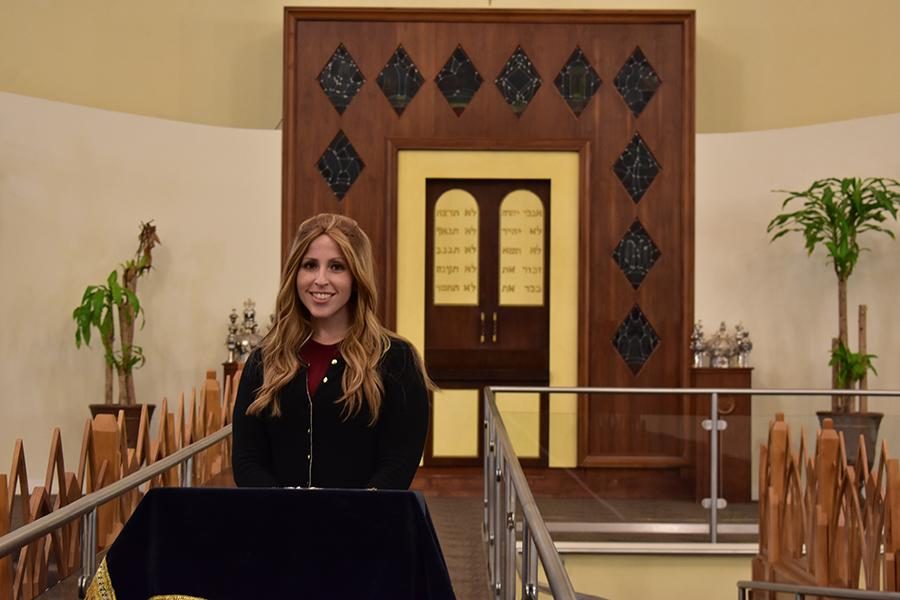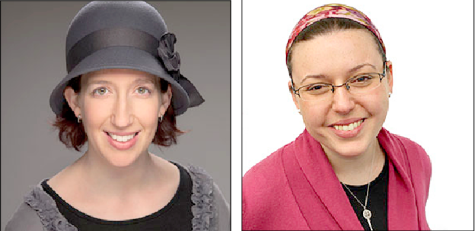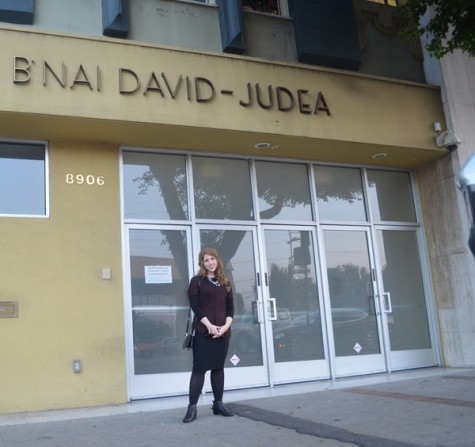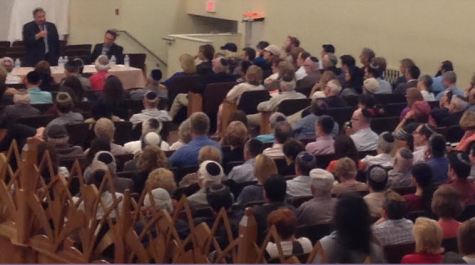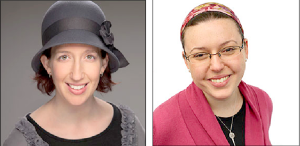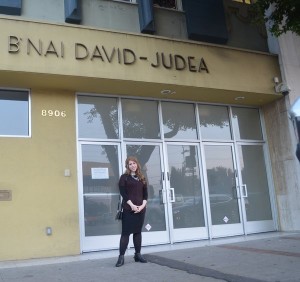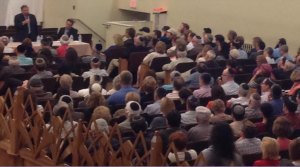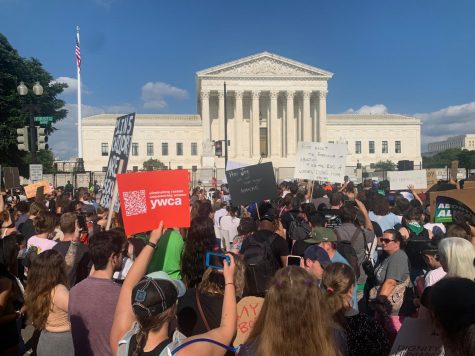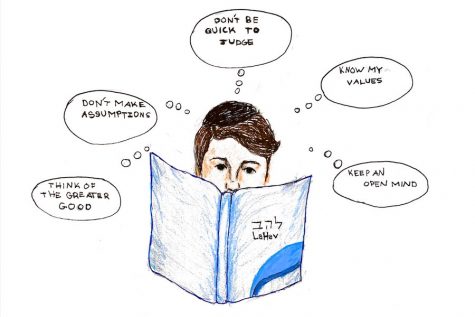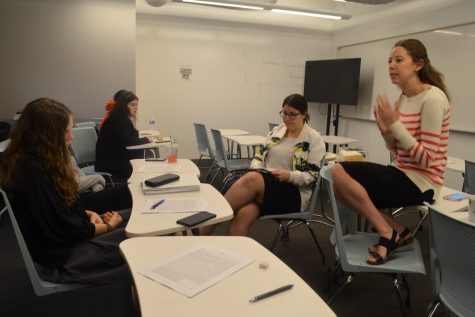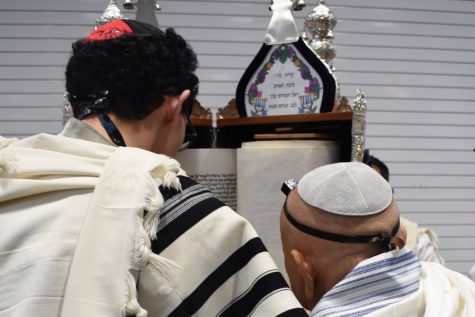B’nai David changes Morateinu’s title to Rabbanit
TITLED: As a spiritual leader of B’nai David-Judea Congregation, Rabbanit Alissa Thomas-Newborn regularly gives d’vrei Torah from the shul’s bima.
For the first time in Los Angeles, a Modern Orthodox shul has given the title rabbanit to a female clergy member. Nearly two years after hiring Alissa Thomas-Newborn as a spiritual leader with the title morateinu — our teacher — the B’nai-David Judea board voted unanimously on Dec. 14 to change her title to rabbanit.
The board had held an open meeting for the congregation on Nov. 2 to discuss potential options for a title change.
“Based upon the thoughts expressed at that meeting, and honoring the preference that Morateinu Alissa herself expressed that night, the Board voted last night to change her title to ‘Rabbanit Alissa,’ effective immediately,” wrote Board President Shana Fishman in an email to the members of the shul on December 15, 2016.
In interviews with B’nai David leaders and members, reasons cited for the change ranged from “Morateinu” being grammatically awkward to “Rabbanit” being more prestigious. Other titles were also considered to reflect what she does at B’nai David.
Rabbanit Thomas-Newborn was pleased with the change.
“The title Rabbanit is a title that is a word with a history that touches on the leadership that women have always played in Judaism that they have given spiritually and interpersonally,” said Rabbanit Thomas-Newborn in an interview with the Boiling Point.
“It’s also a title that in Israel is being adapted by women who have strong knowledge and leadership skills who are serving in schools and shuls,” she said.
Last August, Rabbanit Karmit Feintuch was the first female spiritual leader hired by an Orthdox synagogue in Israel, according to The Forward.
Rabbanit is used by Rabbanit Chana Henkin, who founded NISHMAT, the Jeanie Schottenstein Center for Advanced Torah Study for Women in Jerusalem, where Judaic Studies teacher Mrs. Atara Segal is currently studying in the Yoetzet Halacha program.
When Rabbanit Thomas-Newborn was originally hired, it was with the knowledge that the congregation would revisit her title a year later, according to B’nai David-Judea Rabbi Yosef Kanefsky.
“When we first established the position that Morateinu Alissa was ultimately hired for, we decided on two things simultaneously,” said Rabbi Kanefksy in an interview. “One, that the person’s title would be Morateinu and two, that a year after the person begins we would revisit the question of titles.”
Mrs. Fishman attributed the delayed discussion of the title to a busy board schedule and a change in leadership.
“I think it was just change of president,” said Mrs. Fishman. “Nothing I can think of other than it took a little longer for us to get it on the calendar and finish the conversation.”
About 40 congregants came to voice their opinions at the open board meeting — even though it was the same night as Game Seven of the World Series, according to Shalhevet parent and B’nai-David board member Julie Fax.
“There were a lot of people,” said Mrs. Fax, the mother of students Ezra and Neima Fax, in an interview last week. “It was an open discussion of what would be the best discussion of Morateinu Alissa’s accomplishments, her education, and what she means to our community, while at the same time not jeopardizing our position in the community by not pushing things in one direction or another.”
Mrs. Fishman thought it was necessary to hear everyone’s voice.
“We really wanted to make sure that if we were going to make a change and it was because people wanted us to make a change,” Mrs. Fishman said.
“The original hiring of Rabbanit Alissa was a little controversial,” she continued. “You’re hiring a female spiritual leader. It was important then and it is important now that people have buy-in, that they respect her position and respect her personally.”
Outside of B’nai David, that controversy is likely to continue. Rabbi Elazar Muskin of Young Israel of Century City declined to comment and Rabbi Kalman Topp of Beth Jacob could not be reached for comment.
Rabbi Muskin did not offer an opinion one way or the other, saying it was a B’nai David matter.
“I’m not commenting,” said Rabbi Muskin.
Shalhevet senior Leon Levy, who attends Congregation Mogen David, thought that the title change was problematic.
“I think it’s wrong to go above the boundaries of the community along with changing the roles of women in Judaism,” said Leon. “It puts the rest of the community who doesn’t do this in an awkward positon.
“Rabbi Topp and Rabbi Muskin are in the most awkward position,” Leon said. “I think they disagree with it too, but they don’t want to say it because they’ll lose congregants. It makes our focus of synagogues, of Judaism, be about now the rights of people as opposed to just Torah and prayer. It brings too much politics to Judaism that isn’t needed.”
In 2015, Yeshivat Maharat graduate Ramie Smith turned down a teaching position at Shalhevet because she was told she would not be able to use a clergy title, such as maharat.
At that time, Agudath Israel spokesman Rabbi Avi Shafran told The Boiling Point that Maharat was an improper title.
“The maharat title is universally and correctly understood as a ruse, instituted when the original rabbah proffered by an ‘Open Orthodox’ leader was roundly condemned,” said Rabbi Shafran in 2015.
Other options considered by B’nai David included “Maharat,” “Rabba,” and keeping “Morateinu.”
“A lot of people really liked Maharat because they felt like this is a new thing that we’re doing, and Maharat is the yeshiva where these women are being trained, and we should call them Maharat because that’s the most respectful thing to call them,” said Mrs. Fax. “A lot of people felt strongly that that was what most represented what she’s accomplished in becoming ordained.”
Maharat is the name of the yeshiva where Rabbanit Thomas-Newborn was ordained and stands for manhiga hilchanit, Toranit, meaning spiritual leader, teacher of Torah, expert in Halacha.
“I feel maharat is a made-up word and is a compromised word and I personally did not like maharat,” said Mrs. Fax.
Mrs. Fax said rabba was also mentioned, because it was so closely related to “rabbi,” but that it was not considered seriously because Ms. Thomas-Newborn did not want to be called that, and also possibly because people thought it politically dangerous.
In a speech at B’nai David on June 4, 2015, Chief Rabbi of Efrat Shlomo Riskin who is considered a Modern Orthodox authority said that women should be spiritual leaders, but cannot have the title “Rabba.”
“I’ll say a word about the elephant in the room: the name I do not use is Rabbi or Rabba,” said Rabbi Riskin. “The Rabbi is expected to read the Torah and very often to serve as the cantor of the congregation…This I do not believe women can do halakhically.”
Rabbanit Thomas-Newborn also preferred rabbanit because Yeshivat Maharat approves of it.
“Yeshivat Maharat is an institution that gives s’micha, but does not give titles,” said Rabbanit Thomas-Newborn. “They fully support a variety of titles, rabbanit being one of them, so we were in consultation with them and I am extraordinarily grateful to yeshiva maharat’s involvement.”
At the same time, she wanted her congregants to be comfortable with what they would call her.
“What was most important to me was that it would be the right fit for our community and something that would also be a part of the greater community,” said Rabbanit Thomas-Newborn. “A variety of titles are being used throughout the world at this point. I think it depends on the community you’re in and what’s the right fit for both the person with the title and the community that person’s working in or the institution that person is working in.”
Harry Nelson, a 15-year B’nai-David member and father of Shalhevet students Ami and Noa, said rabbanit is a “powerful” title.
“The title has really changed in meaning and we have many examples of women who may have become rabbanit because they were married to rabbis, but have turned the title into a formal recognition of their leadership,” said Mr. Nelson. “I frankly think that that’s been a part of the rabbanit title for a long time.
“I think it’s a title with dignity and a title that commands respect, and above all a title that people really understand that really resonates, in a way that some of the newer titles can’t because they don’t have as much of a mesora [tradition] behind them.”
Mrs. Fax mentioned Rabbanit Chana Henkin.
“Already for a long time in Israel it has been reclaimed by women who are actually scholars, so you have someone like Rabbanit Chana Hankin who is … a scholar recognized by many people and an innovator in Jewish education, and she’s always been known as Rabbanit Hankin,” said Mrs. Fax.
Junior Maia Zelkha, a member of B’nai-David, thinks that the new title is appropriate.
“I think that there is no reason that she should not be called Rabbanit,” said Maia. “She has a ton of experience, she’s very learned and knowledgeable and respectable.”
Sophomore Lily Drazin agreed.
“She was doing so much for the shul, and she was basically a rabbi and doing pretty much everything Rabbi Kanefsky was doing except for a few things,” said Lily. “I think it’s important that they gave her the title Rabbanit because it carries a lot of importance to it, and she’s a really important person in the shul.”
In an interview with the Boiling Point Dec. 8, B’nai David Rabbi Yosef Kanefsky said that his main problem was that “Morateinu” translates to “our teacher.”
“It’s imperfect because it’s grammatically awkward,” said Rabbi Kanefsky. “In other words, when Alissa has to introduce herself to someone and say ‘Hello, I am Morateinu,’ just grammatically it doesn’t make any sense.”
Shalhevet Judaic studies teacher Rabbi Ari Schwarzberg agreed.
“I think the title morateinu was cumbersome and uncomfortable for some frankly by its unfamiliarity, and Rabbanit is a familiar title and its recognizable, people know what it means,” said Rabbi Schwarzberg.
Rabbanit Thomas-Newborn’s role includes doing “whatever a clergy member should do,” according to Mrs. Fishman.
“I love giving drashas and teaching shiurim,” or classes,” said Rabbanit Thomas-Newborn. ” I love pastoral care, I love counseling people, such a privilege to be with people during b’ezrat Hashem the good times in life and chas v’shalom in times that are much harder.
“I just love the work I do in the shul.”
Many community members appreciate having a female clergy member.
“It adds another dimension to the leadership in the community,” said Mr. Nelson. “I’m a father of two sons and two daughters and I think it’s very important to have, not only for my daughters, but especially for my daughters to see that women can play very public leadership roles in Jewish communal life.
“It filled a hole and have I heard from many friends whether it’s been going through grieving or any very challenging life process, it just brings a different perspective.”
Sophomore Bailey Mendelson agrees that it is important for the shul to have a female spiritual leader.
“I think in our time a woman who knows as much as a Rabbi is needed,” said Bailey. She is the one who represents the women. She is showing women are capable of doing as much as a Rabbi can.
Rabbi Schwarzberg found it “admirable” that B’nai-David was willing to change her title.
“Some people don’t like to recognize that a mistake was made or there is another way of doing things and this is a new process,” said Rabbi Schwarzberg. “There’s no doubt that in 10, 15, 20 years from now when this becomes a little more normal, or when I think it will become more of the norm, it will be a title the Jewish people are familiar with, but whenever you’re a pioneer, whenever you’re doing something new, it’s going to take some time.”
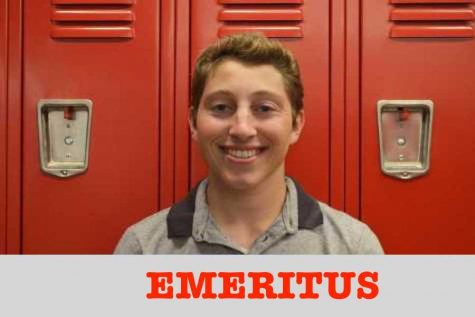
Since freshman year, Alec Fields has written numerous stories for the Community, Torah, Features, Outside News, Sports and Arts and Culture sections. In 10th grade, Alec received the post of Torah editor and held that position until being named co-Editor-in-Chief for the 2016-2017 school year. He has received awards for, "SUMMER OF WAR: Hollywood, too, was divided," “Refusing Playoff Suspension, Buckley Resigns,” “OUT OF THE SHADOWS: Ancient tradition meets modern sensibility,” and for “Rabbi who sauna-ed with students in New York was scholar-in-residence at Beth Jacob on Shavuot.” Alec is co-captain of Model Congress, co-president of the Finance Club, a founder of Supplies on Demand, a member of the Mock Trial team, Firehawks for Israel, tennis team and grappling club. Some of his favorite classes are Political Theory of Modern Middle East, Psychology, and Government and Economics. When Alec has time he enjoys playing or watching sports, reading...

